A Fight for Land and Livelihood
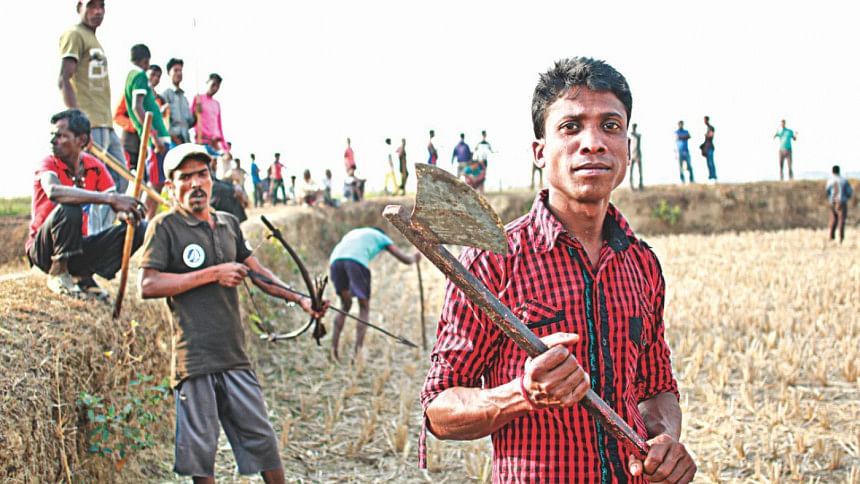
PHOTOS: KAZI TAHSIN AGAZ APURBO
Mondagini Bakti stands in front of me with her left hand on her hip and her right hand outstretched towards the light, her palm stained with the yellow of ground turmeric. "Usually, I grow tomatoes, sometimes potatoes and also eggplants. But this year, I've also planted some watermelons. They're still seedlings, but I expect them to grow very big", she quipped.
"You see, when our ancestors came here, they had nothing and when we tried to escape the British, they hunted us down and brought us back,' said Kanak Rajbangshi, the women's leader (sardarni) of Begumkhan tea garden inside Chandpur Tea Estate. "When they were brought back, the British pointed to hills and told us that if we wanted to, we could farm there. And that's what we've done for over a hundred years. The wage from working on the tea fields did not sustain us then, and it doesn't sustain us now. It's the land that keeps us alive."
Suddenly, there was a ripple of footsteps outside the lawn where we were all sitting, and the faint trill of a bell. "They've crossed the bridge!" exclaimed Ponchomi, tea worker for over 50 years now. "Let them come," replied another, who sat a little further back and covered her face with a white saree. "The only way they'll move us is if they kill us all".
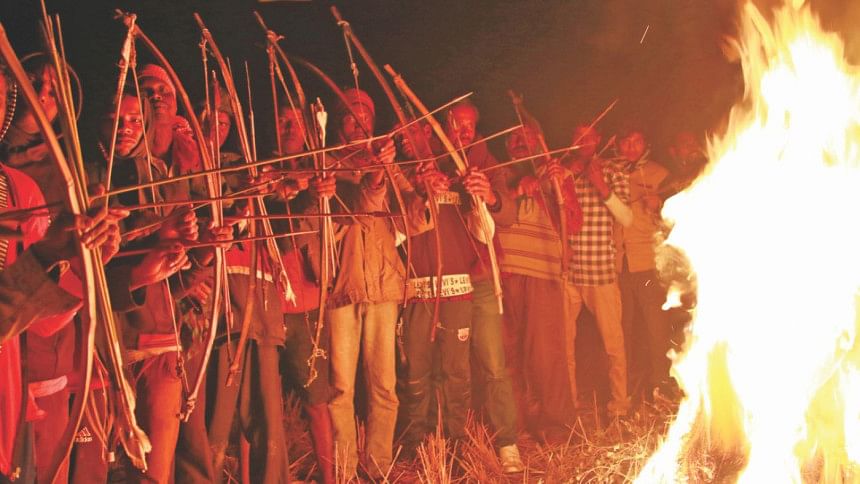
What happened next was a spectacle that could hardly be believed. A flurry of footsteps and a few loud cries later, the women had vacated the spot and gone into their respective homes. They came out wielding large machetes and sticks and in a few cases, bows and arrows. The women rushed to join their fellow workers on their end of the Chunarughatbridge to stop the villagers from coming onto their land campaigning for the setting up of an economic zone on their farmland. Each garden has a bell that they call the paglaghonta. When the bell tolls, wherever workers may be, they will abandon their posts and join wherever the crowd is leading. This truly astonishing display of collective organising brought about 6000 workers on the bridge at 1:30 in the afternoon on a Saturday in the middle of puja preparations.
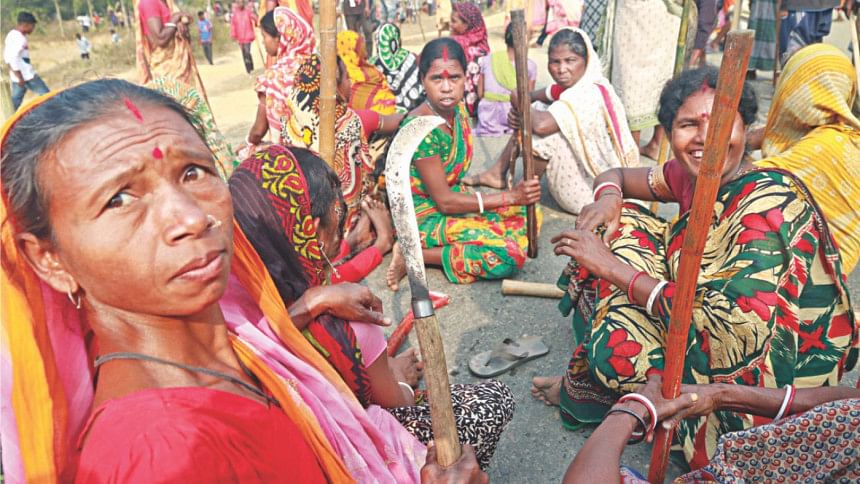
To understand what is happening in Habiganj today, we must first look back over the duration of an entire century, in order to map the existence of tea workers in this area of the Indian sub-continent. Official documents say that these tea workers were brought from various regions of India, including Bihar, Madras, Andhra Pradesh and West Bengal. They were mostly scouted from the extremely poor regions and were promised that they were being taken to a place where 'gold grew on trees'. That much remains accurate. What was deliberately left out was that they would never get to share in the profit of this precious commodity. They had to live only in the compound, and their fixed wage rate began from about 10 cents back in the day and is now a whopping Tk.69. The tea companies provided a meagre amount of rice for them to survive (which stands at around 3kg of rice every week right now) and left them to figure out the rest. This practice continues to this day, in blatant disregard of all kinds of labour laws or human rights ordinances all around the world.
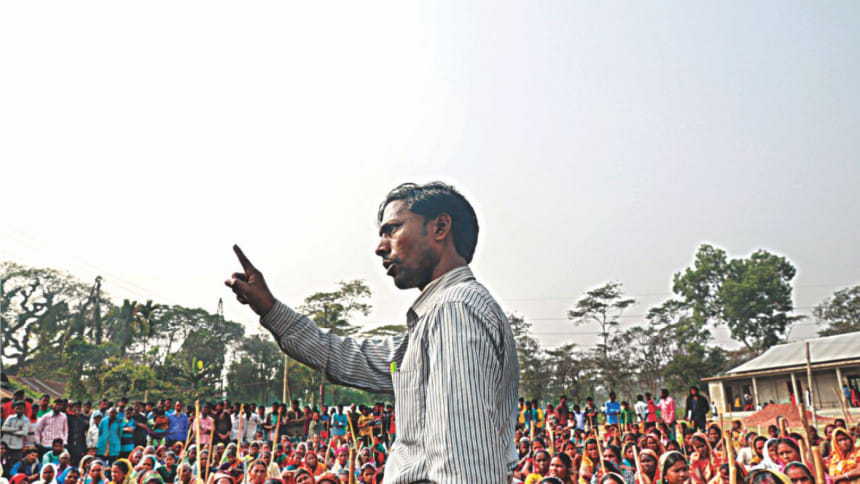
Because the workers have existed for so long as bonded slaves, they do not even own the land on which they have lived and farmed for over a 100 years. Any moment, the 'owners' can take it away from them. And in the case of Chandpur Tea Estate in Habiganj, the 'owners' are the Bangladeshi government. They had leased the land to Duncan Brothers and now want a portion of it back. 512 acres to be precise. And for some incomprehensible reason, they have decided that they want the workers' farm land in order to build a special economic zone (SEZ).
"No one told us anything about an economic zone. We found out when an advertisement appeared in a local newspaper in 2014 that this place had been earmarked for that," says Nripen Pal, tea worker for over 25 years and additional secretary of the Central Tea Workers' Union. "That was the day we started our protests, because the simple math is that we will starve to death if this happens". It was through another advertisement that they found out that BEZA (Bangladesh Economic Zone Association) would start work on the 13th of December, 2015. From that day, the movement gained pace and tea workers' have been occupying the streets, suspending work and carrying out processions every day since.
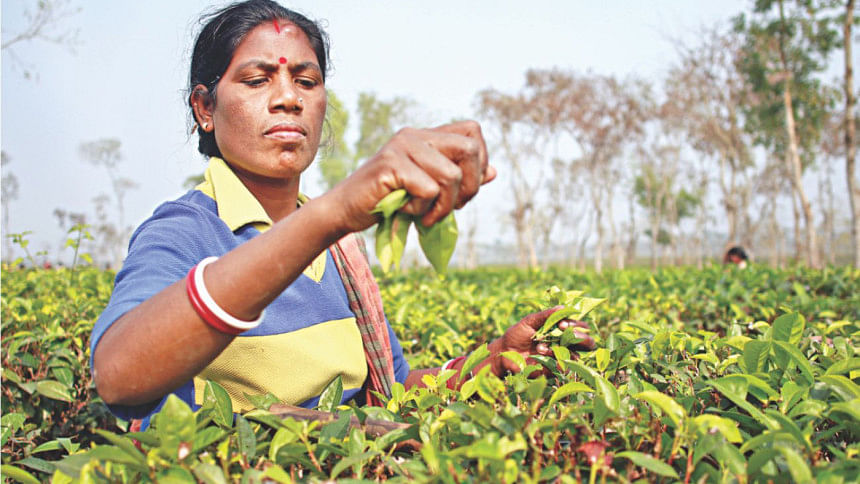
"We went to several government officials and organisations. We were categorically told that this land does not belong to us. In fact, we were told that we weren't even Bangladeshis, that we were Indians who live here on a contract", said Biren Pal, a leading organiser of the movement. "Neither I nor my father have set foot in India, but we have somehow become Indians? Whose land is it, then, if we have shaped it into what it is today, taken care of it and survived off of it?"
Nripen Pal looked haggard as he took a long drag from his cigarette. He had been up all night planning the next course of action. "This incident is another one in a long line where tea workers' have been treated like chattel. We've been treated like dirt, told that we don't belong here and yet have made millions of dollars for our masters. Now, we have decided that this cannot be any longer. We will not let anyone set up an economic zone on our farmland, but more than that, we want the right to our land."
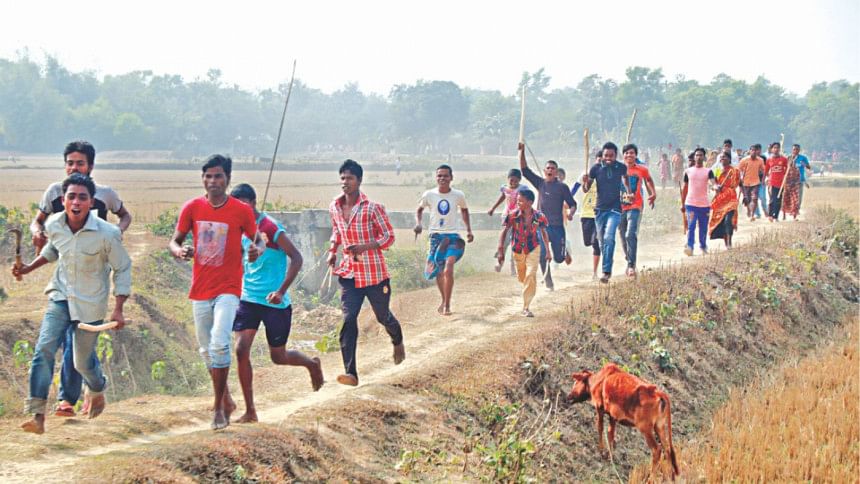
What started as a protest against governmental injustice has now bloomed into a full-fledged revolution that demands personhood in a state that has largely left the tea workers' on the sidelines. It is not just the state of Bangladesh that has done them a grave injustice. The British and the Pakistanis are equally culpable. Right now, the 512 acres has become a symbol for resistance. The real movement now revolves around their rights to their land. And it is no longer just a revolution in Chandpur. It is slowly but surely spreading to all the tea gardens in the country.
In the present context, BEZA executive chairman Paban Chowdhury must shoulder some of the blame, for he initially made the claim that the government was only looking at arid land. An official government study made the claim that the land was arid but the chairman visited the tea estate and yet somehow did not notice the farming that is still occurring on the land. After inspecting the land for a good five days and listening to the workers' accounts, there can be no doubt that this land reaps crops and sustains this marginalised population. But recent events are only part of a catalogue of wrongs done to this community. What it has done, though, is that it provided a spark that ignited the dissent that has been invisible since colonial times. The scars of discontent run very, very deep and grow deeper with every communal slight and discriminatory action. The local politics of it is such that BNP, AL and JP party leaders all came together in a human chain to demand that the economic zone be set up. No doubt there is a lot of money to be made from an investment zone that will create less jobs than it has promised to both sides.
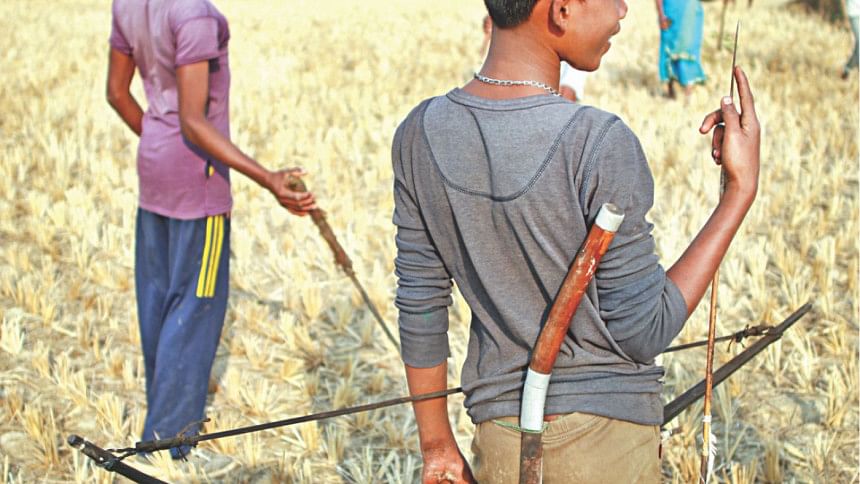
From the outside looking in, the world of the tea gardens may appear to be one populated with a helpless community just toiling in order to survive. To make such a judgement would be to overlook the vibrancy and the creative lifestyle of a people that have been oppressed beyond comprehension, and have still risen to navigate their environment. To approach them with pity would also be to regress back into the kind of superior discourse that marginalised them in the first place. Instead, we, the citizens of this country must look to them as the modern-day revolutionaries that they are. The ones that have displayed an immeasurable amount of strength and conviction to get to the place that they have done. It falls on us to aid them in righting the wrongs of an entire century's worth of oppression.
A few column inches is not enough to flesh out the complexity of the movement that is unfolding today. A bus ride is all it would take to verify all the facts mentioned in this article. At the same time, the pressing question many of us might ask is, what can we possibly do? We can begin by lobbying BEZA and then moving on to hold the Tea Board accountable for turning a blind eye towards the suffering of an entire community. Today, Mondagini Bakti will go to her field to tend to her watermelon seedlings. She will carry a machete with her, just in case. In the evening, she will pray for her land, her home and her identity. Let us pray with her.

 For all latest news, follow The Daily Star's Google News channel.
For all latest news, follow The Daily Star's Google News channel. 



Comments